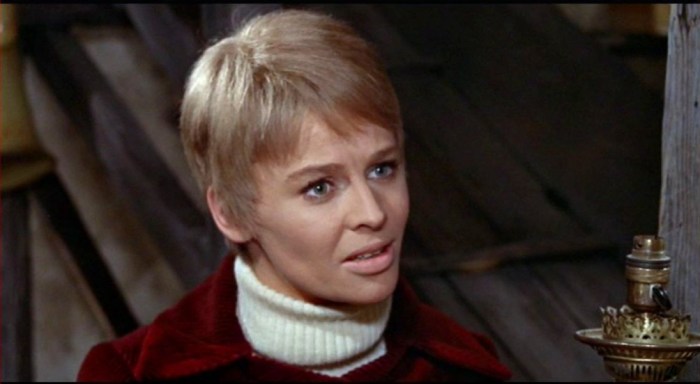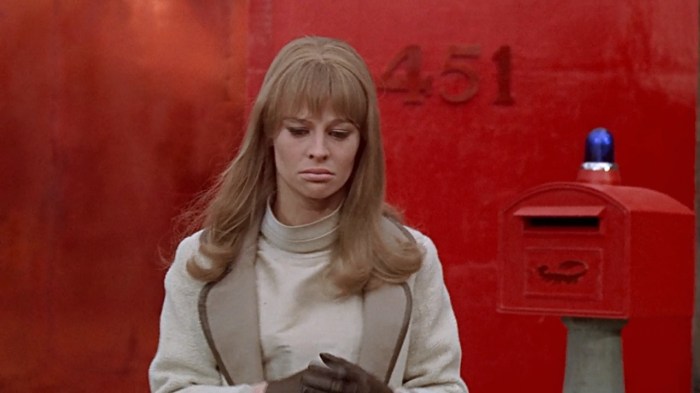What page does Clarisse die? This intriguing question sparks a captivating exploration into the poignant narrative of Ray Bradbury’s “Fahrenheit 451.” Clarisse McClellan, an enigmatic and thought-provoking character, plays a pivotal role in the protagonist Montag’s journey, challenging his beliefs and igniting a flame of rebellion within him.
Her untimely demise leaves a profound impact, leaving readers eager to unravel the circumstances surrounding her tragic end.
As we delve into the pages of “Fahrenheit 451,” we witness Clarisse’s profound influence on Montag, a fireman tasked with burning books in a dystopian society that suppresses individuality and critical thinking. Through her insightful observations and unconventional perspectives, Clarisse awakens a sense of doubt and curiosity within Montag, gradually eroding his adherence to the oppressive norms.
Clarisse McClellan’s Role and Significance

Clarisse McClellan is a pivotal character in Ray Bradbury’s dystopian novel, “Fahrenheit 451.” Her presence challenges Montag’s conformity and sparks a profound transformation in his life. Clarisse embodies a sense of wonder, curiosity, and individuality that contrasts sharply with the oppressive and sterile society depicted in the novel.
Challenging Montag’s Beliefs
Clarisse’s questions and observations force Montag to confront the emptiness of his existence. Her fascination with nature, her appreciation for individuality, and her willingness to question authority all challenge the values that Montag has unquestioningly accepted. Her presence makes Montag realize the shallowness of his life and the need for meaningful connections and experiences.
Symbolism of Nature and Individuality, What page does clarisse die
Clarisse’s association with nature symbolizes her connection to life and individuality. Her dandelion represents the beauty and fragility of life, while her walks in the park symbolize her desire for freedom and exploration. In contrast, the sterile and artificial world that Montag inhabits represents the suppression of nature and individuality.
The Circumstances of Clarisse’s Death

Clarisse McClellan’s enigmatic disappearance and presumed death remain a pivotal event in Ray Bradbury’s dystopian novel, Fahrenheit 451. Her sudden absence casts a profound impact on Montag, the protagonist, triggering a series of profound emotional and psychological shifts.
Prior to her disappearance, Clarisse had a brief but profound encounter with Montag, leaving him with a sense of curiosity and a longing for a deeper understanding of life beyond the confines of their rigidly controlled society. However, her unconventional thoughts and demeanor raised suspicions among the authorities, leading to her abrupt departure.
Reasons Behind Clarisse’s Disappearance
Clarisse’s disappearance is shrouded in mystery and speculation. It is implied that she was apprehended by the authorities due to her unconventional behavior and nonconformity. Her questioning of societal norms, her love of nature, and her refusal to conform to the collective mindset made her a target for those seeking to maintain order and suppress dissent.
Montag’s suspicion that Clarisse was killed by a hit-and-run driver is a symbolic representation of the society’s willingness to silence those who challenge the status quo. Her untimely demise serves as a chilling reminder of the consequences of individuality and independent thought in a world that values conformity above all else.
Impact on Montag’s Emotional and Psychological State
Clarisse’s disappearance and presumed death have a profound impact on Montag’s emotional and psychological state. Her absence leaves a void in his life, as he realizes the depth of her influence on him. Her words and actions had planted seeds of doubt and curiosity in his mind, awakening a desire for something more than the superficial existence he had known.
Montag’s subsequent actions, such as hiding books and questioning the fireman’s role in society, can be seen as a direct response to Clarisse’s influence. Her death serves as a catalyst for his own transformation and rebellion against the oppressive society he lives in.
The Aftermath of Clarisse’s Death

The untimely demise of Clarisse McClellan had a profound impact on Montag, the protagonist of Ray Bradbury’s dystopian novel, Fahrenheit 451. Her absence left an irreplaceable void in his life, triggering a chain reaction that ultimately led to his rebellion against the oppressive society.
Initially, Montag was deeply affected by Clarisse’s death. Her vibrant spirit and unconventional nature had ignited a spark within him, making him question the suffocating conformity of his surroundings. Her absence created a gaping hole in his existence, leaving him feeling lost and directionless.
Montag’s Character Development
In the aftermath of Clarisse’s death, Montag embarked on a journey of self-discovery. Her memory became a catalyst for his transformation, as he began to shed the apathy and ignorance that had previously defined him. Through conversations with Faber, a retired English professor, and exposure to forbidden literature, Montag gradually awakened to the oppressive nature of the society he lived in.
Clarisse’s absence also served as a constant reminder of the dangers of suppression and the importance of individuality. Her tragic end reinforced the need for resistance, driving Montag to challenge the authoritarian regime and its suffocating control over knowledge and thought.
Clarisse dies in Fahrenheit 451, but I can’t recall the exact page number. For a detailed explanation of the net ionic equation for the reaction between potassium hydrogen phthalate (KHP) and sodium hydroxide (NaOH), you can refer to this article . However, I’m still curious about the page where Clarisse meets her unfortunate end.
Montag’s Growing Rebellion
As Montag’s understanding of the society deepened, so too did his resolve to rebel against its oppressive forces. Clarisse’s death became a rallying cry for him, inspiring him to take action against the dystopian regime. Her memory fueled his growing disillusionment with the Firemen’s destructive mission and the society’s obsession with censorship and conformity.
Montag’s rebellion manifested itself in various ways. He began to question the Firemen’s role in suppressing knowledge and destroying books. He sought out forbidden literature, immersing himself in the works of great thinkers and writers who had been silenced by the regime.
Clarisse’s Death as a Symbol: What Page Does Clarisse Die

Clarisse’s untimely demise in “Fahrenheit 451” serves as a potent allegory for the systematic suppression of individuality and free thought within the dystopian society depicted in the novel.
Her death underscores the oppressive nature of the regime, which seeks to extinguish any deviation from the prescribed norm. Clarisse’s inquisitive nature and nonconformist spirit pose a threat to the government’s carefully crafted facade of conformity and control.
Societal Control and Censorship
Clarisse’s death reverberates throughout the novel as a grim reminder of the lengths to which the government will go to silence dissenting voices. Her untimely end becomes a symbol of the broader societal control and censorship that permeates every aspect of life in this dystopian world.
The suppression of free thought and the erasure of individuality are essential tools for maintaining the government’s iron grip on power. By eliminating those who question the status quo, the regime effectively quells any potential resistance or rebellion.
Comparison to Other Instances of Oppression
Clarisse’s death is not an isolated incident but rather one of many instances of oppression and silencing in the novel. The government’s relentless pursuit of conformity manifests in various forms, including the banning of books, the surveillance of citizens, and the use of violence to suppress dissent.
Clarisse’s death stands as a stark example of the consequences faced by those who dare to challenge the established order. Her fate serves as a chilling warning to others who might harbor similar aspirations.
Questions Often Asked
On what page does Clarisse die in “Fahrenheit 451”?
Clarisse’s exact page of death is not explicitly stated in the novel.
What are the circumstances surrounding Clarisse’s disappearance?
Clarisse vanishes mysteriously, and her fate remains unknown. It is speculated that she was killed by the authorities for her nonconformist views.
How does Clarisse’s death impact Montag?
Clarisse’s death profoundly affects Montag, leading him to question his beliefs and ultimately rebel against the oppressive society.
